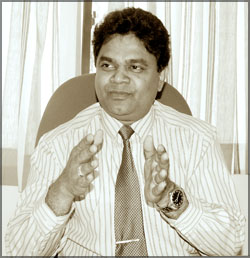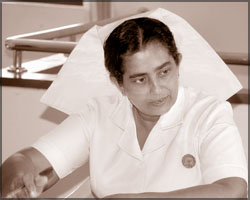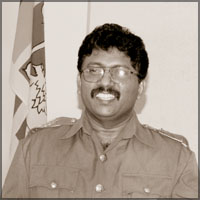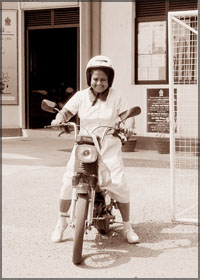Achieving productivity through attitude change
The success story of MOH’s Office, Rambukkana:
Sajitha PREMATUNGE
[email protected]
|

MOH of Rambukkana
|
 |
|
Dr. Kumara Wickramasinghe,
Medical Officer of Health Rambukkana |
One of the unique features that possibly helped the Rambukkana MOH’s
office to bag an award in the Productivity Awards 2007, Sabaragamuwa
province. Presented by the Productivity Secretariat, the best service
providers are selected from among government as well as private
institutions. Dr. Kumara Wickramasingha - Medical Officer of Helth,
Rambukkana - claims that, with their limited funding and resources, it
was a great achievement indeed.
The Suwamaga volunteer service as well as clinics for pregnant women
in remote villages, awareness and training programmes and the MOH’s
campaign to elevate the overall standard of not only health, but of
living as a whole, of the locals are few of the unique services provided
by the Rambukkana MOH’s office, that employs two doctors - Dr.
Wickramasingha and Anula Wijesundara - one sister, eight PHIs and 30
midwives.
The MOH’s office of Rambukkana has clearly gone beyond their call of
duty in their attempt to achieve their mission Suwa nagamu, lowa dinamu.
And their endeavor is to stand on their own as an institution that
provides medical services. Dr. Wickramasinghe explained how they single
handedly prevented the MOH’s office from being overgrown with weeds,
planted coconuts and jack in the yard. “We don’t rely completely on
government funds.” says Dr. Wickramasinghe. “We have a fund of our own,
that now amounts to Rs. 100,000.” Dr. Wicramasinghe explained how they
got the rejected furniture down from the Kegalle Hospital and repaired
them, by themselves. “We use discarded stationary to make envelopes for
medicine. Our objective is to reuse and recycle as much as possible.”

Sister B.I.M Hettiarachchi |

PHI Fonseka |
Dr. Wickramasinghe also observed that most people buy unnecessary
foodstuff that are unhealthy. “They buy a lot of vegetables at the fair,
that are actually not necessary. In fact a lot of fertilizer and
pesticides is used on some of these vegetables.” To improve the eating
habits of the locals Dr. Wicramasingha has developed an ingenious
method. Through midwives he advised the locals to start home gardens,
construct compost bins and a pit to dump waste water. “It saves them
time and money that was earlier spent on unhealthy food.” He had also
advised them to grow kohila in the waste water pit.Dr. Wickramasinghe
explains that according to a survey conducted last year over Rs. 8.5
million was spent on cigarettes Rs. 10 million on liquor and two million
on betel chewing each month, resulting in poverty. “So we went to all
the boutiques and asked the owners not to sell cigarettes and betel. We
educated the owners and the public of their adverse effects. In a matter
of weeks they stopped selling these items.” But he explained that this
proved impossible to continue because of various external influences.
Another attempt of the MOH’s office is to improve the hygiene of food
handling places. Every food handling place in Rambukkana now has a
notice indicating the requirements of a proper food handling place.
Any customer who feels that a certain food handling place is not up
to standard, can complain to the MOH’s office, the contact number of
which is indicated in the notice itself. “Our main objective has been
quality control.” He claimed that within the last four years, this was
practised, 10 lakhs worth of fines were imposed, based on complaints,
followed by law suits. “All of the money goes to the government.”
Their prenatal mobile clinic services which provide medical care to
pregnant women - in peripheral villages, such as Hewadiwela,
Parape-Walalgoda, Naranbedda, Deliwala and Udagaldeniya, 14 in all - is
unparalleled. Dr. Wickramasingha explained that checking the haemoglobin
level of blood and identifying the blood group of pregnant women is of
utmost importance, when ensuring their health, in addition to checking
urine, pressure and the condition of the foetus. He claimed that he and
his staff go to these periphery villages in person in order to collect
their blood and urine samples. Something that the women would have had
to get done from the Kegalle Base Hospital had it not been for the
facility of the Rambukkana MOH’s office, standing in queues for hours on
end to give the samples and yet again to collect reports.
This mobile facility of the Rambukkana MOH’s office collect blood and
urine samples, transport them to the Kegalle Base Hospital in a cab and
a three wheeler, provided by the government and bring the reports back
to the pregnant women. The Rambukkana Hospital does not provide these
services and obtaining them from private medical institutes prove to be
highly costly, well beyond the capabilities of the pregnant women of
these peripheral villages. Sister B.I.M. Hettiarachchi - who seemed too
busy even to talk to us, since she had a new batch of samples to be
catalogued and sent to the Kegalle Hospital - goes to the villages
herself and draws blood. “We have to visit around seven clinics a
month.”
Another unique featuremade by the Rambukkana MOH is soon to be
introduced to the general health care system. The Rambukkana MOH’s
office was the first facility to introduce the inclusion of contact
numbers of doctors and midwives in the health report. In fact the health
report of every pregnant woman under the jurisdiction of the Rambukkana
MOH, contains Dr. Wickramasingha’s mobile number and that of the
respective midwives.
This comes very much in handy, specially since every mother is
visited by a midwife twice in the first ten days. According to Dr.
Wickramasingha the Ministry have approved this and is hoping to
introduce this to all medical institutions in the near future.
|

A midwife on a moped bike |
The Rambukkana MOH’s campaign on battling noncommunicable diseases
such as diabetes and cancer, is also commendable, in the sense that they
provide mobile medical checkups. Dir. Wickramasinghe claims that many
government servants and senior employees of the private sector often
tend to neglect their health. Consequently the mobile health care teem
of the Rambukkana MOH’s office goes to the patients.
He explained that they go to government offices, police stations,
schools, etc... and conduct basic medical tests check their pressure,
vision and even conduct cancer tests if necessary, free of charge. “Even
in the least advanced medical facilities this sort of checkup could cost
up to Rs. 3000.” Moreover the doctor explained that there are a few
streams in the area and malaria is a recurrent threat. A field officer,
every once in a while, conducts mass camps and draws blood to test for
malaria.
Other reasons for the success of Rambukkana MOH’s office is the 5S
method and their strict routine and the leadership of Dr. Wickramasinghe.
“Every officer of our staff has a specific task. Specially the field
officers.” explained the doctor. “We all have a routine of our own.”
Thirty midwife areas - 3000 families under one midwife - and eight
PHI areas fall under the jurisdiction of the Rambukkana MOH’s office.
“All PHIs have to work six days a week. They have a specific schedule
for each day.” explained the doctor. “It’s easier for the PHIs as well.”
On assigned days they have to inspect houses and businesses, sample
food, attend to health education and health services programmes, school
health programmes and environmental health.
Speaking of health education, awareness creation is one of the main
objectives of the Rambukkana MOH, in elevating the health standards of
the Rambukkana area. Their Suwamaga volunteer group is now 100 members
strong and has grown into a health network consisting of smaller village
based groups. Moreover through their Audio Visual Unit and its
documentaries on health practices and policies, PHI Fonseka has been
successful in achieving this objective.
Various training programmes for the staff of the MOH include training
on computer competence, Languages - English and Tamil, which applies to
even the children of the staffers - modern management techniques and
even riding bikes! “Mopeds bikes provided by the government, for the use
of midwives, were just sitting around, until I finally forcibly trained
the midwives on how to use the bike.” said Dr. Wickramasingha laughing.
As the doctor explained, in most other cases these bikes are being used
by the other family members of the midwives.
The main obstacle according to Dr. Wickramasingha, when striving to
improve the health sector of Sri Lanka, is the attitudes of the people.
“Sri Lankan people need to undergo an attitudinal transformation.” And
the only solutions for this according to him is training and education. |

